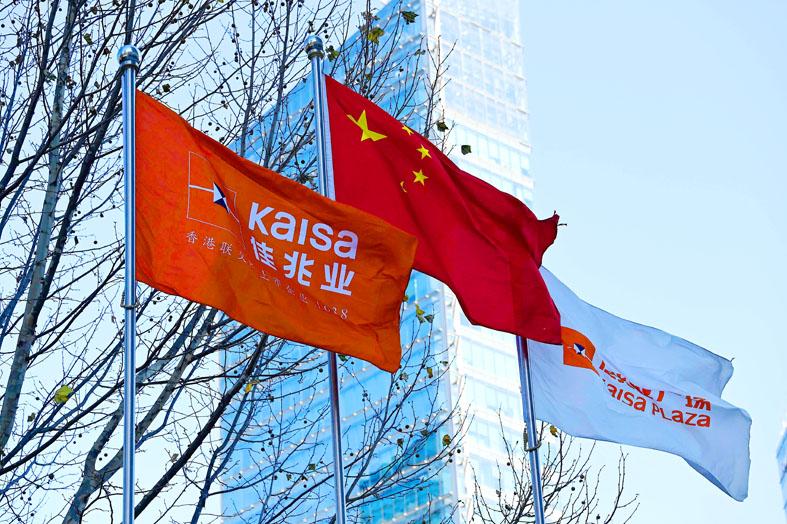Chinese property developer Kaisa Group Holdings Ltd (佳兆業集團) yesterday said it failed to secure the minimum 95 percent approval it needed from offshore bondholders to extend the maturity of a US$400 million note due next week, raising the risk of a default.
With the Chinese property sector gripped by an unprecedented liquidity squeeze, Kaisa now faces the possibility of defaulting on its 6.5 percent offshore bonds due on Tuesday and drawing renewed focus on other developers also staring at a wall of offshore debt maturing over the next few months.
Kaisa had hoped to exchange the US$400 million 6.5 percent offshore bonds for new notes due June 6, 2023, at the same interest rate if at least 95 percent of holders accepted. It did not disclose how many bondholders had consented to the offer.

Photo: AFP
STOCK PLUNGE
Shares of the embattled property firm dropped 9.8 percent in intraday trading to a record low of HKUS$0.92, taking the stock’s plunge so far this year to about 75 percent.
The firm, which became the first Chinese property developer to default on its dollar bonds in 2015, said it had been in talks with representatives of certain bondholders, but no “legally binding agreement” had been entered into yet.
“To ease the current liquidity issue and reach an optimal solution for all stakeholders, the company is assessing and is closely monitoring the financial condition and cash position of the group,” it said yesterday.
It added that it was still exploring selling assets and extending or renewing debt obligations, but cautioned there was no guarantee it would be able to meet the maturity date.
A failure to repay or reach an agreement with creditors would have “a material adverse effect” on Kaisa’s financial condition, it said.
Kaisa is the second-largest dollar bond issuer among China’s property developers after China Evergrande Group (恆大集團), which has more than US$300 billion in liabilities, and like the others has been scrambling to raise capital to stave off a default.
Reuters reported last month that the firm was looking to sell its Hong Kong-listed property management unit, Kaisa Prosperity Holdings Ltd.
Last week, in its notes exchange offer, Kaisa Group said it could consider a debt restructuring exercise if bondholders did not approve the extension of maturity.
Its failure in getting a much-needed lifeline from its creditors would also weigh on other smaller developers that are looking to avoid long and messy litigation and restructuring processes, analysts have said.
EVERGRANDE
Also on the horizon is the end of a 30-day grace period for Evergrande, which has been narrowly avoiding defaults, after it failed to pay coupons totalling US$82.5 million due on Nov. 6.

MULTIFACETED: A task force has analyzed possible scenarios and created responses to assist domestic industries in dealing with US tariffs, the economics minister said The Executive Yuan is tomorrow to announce countermeasures to US President Donald Trump’s planned reciprocal tariffs, although the details of the plan would not be made public until Monday next week, Minister of Economic Affairs J.W. Kuo (郭智輝) said yesterday. The Cabinet established an economic and trade task force in November last year to deal with US trade and tariff related issues, Kuo told reporters outside the legislature in Taipei. The task force has been analyzing and evaluating all kinds of scenarios to identify suitable responses and determine how best to assist domestic industries in managing the effects of Trump’s tariffs, he

TIGHT-LIPPED: UMC said it had no merger plans at the moment, after Nikkei Asia reported that the firm and GlobalFoundries were considering restarting merger talks United Microelectronics Corp (UMC, 聯電), the world’s No. 4 contract chipmaker, yesterday launched a new US$5 billion 12-inch chip factory in Singapore as part of its latest effort to diversify its manufacturing footprint amid growing geopolitical risks. The new factory, adjacent to UMC’s existing Singapore fab in the Pasir Res Wafer Fab Park, is scheduled to enter volume production next year, utilizing mature 22-nanometer and 28-nanometer process technologies, UMC said in a statement. The company plans to invest US$5 billion during the first phase of the new fab, which would have an installed capacity of 30,000 12-inch wafers per month, it said. The

Taiwan’s official purchasing managers’ index (PMI) last month rose 0.2 percentage points to 54.2, in a second consecutive month of expansion, thanks to front-loading demand intended to avoid potential US tariff hikes, the Chung-Hua Institution for Economic Research (CIER, 中華經濟研究院) said yesterday. While short-term demand appeared robust, uncertainties rose due to US President Donald Trump’s unpredictable trade policy, CIER president Lien Hsien-ming (連賢明) told a news conference in Taipei. Taiwan’s economy this year would be characterized by high-level fluctuations and the volatility would be wilder than most expect, Lien said Demand for electronics, particularly semiconductors, continues to benefit from US technology giants’ effort

‘SWASTICAR’: Tesla CEO Elon Musk’s close association with Donald Trump has prompted opponents to brand him a ‘Nazi’ and resulted in a dramatic drop in sales Demonstrators descended on Tesla Inc dealerships across the US, and in Europe and Canada on Saturday to protest company chief Elon Musk, who has amassed extraordinary power as a top adviser to US President Donald Trump. Waving signs with messages such as “Musk is stealing our money” and “Reclaim our country,” the protests largely took place peacefully following fiery episodes of vandalism on Tesla vehicles, dealerships and other facilities in recent weeks that US officials have denounced as terrorism. Hundreds rallied on Saturday outside the Tesla dealership in Manhattan. Some blasted Musk, the world’s richest man, while others demanded the shuttering of his